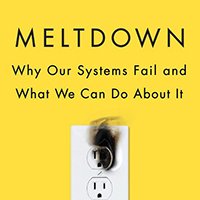New
Hubris Forum, in association with Surrey Business School
Organised by Professor Eugene Sadler-Smith and Dr Graham Robinson 5 December 2018, 13:30 – 16:30 GMT 66 MS 03, Surrey Business School, Rik Medlik Building, Stag Hill, Guildford. GU2 7XH The event...
Written by: Daedalus Trust
Read moreWhy great success can bring out the worst parts of our personalities (2018)
"The more power and influence you have, the less interested you will be in pleasing other people and in keeping your dark side in check." Lovric D., Principal at Incandescent, and...
Written by: Darko Lovric and Tomas Chamorro-Premuzic
Read moreWhen doing good garners bad press (2018)
"Firms that engage in corporate social outreach should make sure to send consistent signals." Georg Wernicke, Assistant Professor of Strategy and Business Policy, HEC Paris. Insead Knowledge, 14 June 2018...
Written by: Georg Wernicke
Read morePeople who think their opinions are superior to others are most prone to overestimating their relevant knowledge and ignoring chances to learn more (2018)
Tom Stafford, psychologist at University of Sheffield. Research Digest, The British Psychological Society, 31 May 2018. Image: FreeImages.com/Lotus Head New research suggests that whilst one's opinion might be held superior without...
Written by: Tom Stafford
Read moreWhy it’s so hard to speak up against a toxic culture (2018)
"...Silence is pervasive in organizations due to the widely shared belief that speaking up about sensitive issues is futile or even dangerous." Francesca Gino, Harvard Business Review, 21 May 2018...
Written by: Francesca Gino
Read moreEpistemic vices in organizations: knowledge, truth, and unethical conduct (2018)
The conviction that one has authority or superiority where one in fact lacks it is a sign of epistemic hubris, and business leaders who possess this trait "indulge in a...
Written by: Christopher Baird, Thomas S Calvard
Read morePower corrupts, but control does not: what stands behind the effects of holding high positions (2018)
New research aims to disentangle the relationships between holding high positions, power over others, personal control, and antisocial tendencies. Cislak, A., Cichocka, A., Wojcik, A. D., & Frankowska, N. Personality and...
Written by: Aleksandra Cislak, Aleksandra Cichocka, Adrian Dominik Wojcik and Natalia Frankowska
Read moreHow having power is like having brain damage: a new book explains why systems fail (2018)
'Meltdown. Why our systems fail and what we can do about it', Clearfield, C., & Tilcsik, A. Atlantic Books, 2018. Excerpt via The Star, 1 April 2018. A new book,...
Written by: Chris Clearfield & Andras Tilcsik
Read moreManagerial hubris detection: the case of Enron (2018)
Eckhaus, E. & Sheaffer, Z. Department of Economics and Business Administration, Ariel University, Israel Risk Management (2018) pp 1-22. https://doi.org/10.1057/s41283-018-0037-0 Image: Scott Beale/ Flickr (CC-BY-NC-ND 2.0) New research from scientists at the Ariel University...
Written by: Eyal Eckhaus, Zachary Sheaffer
Read moreWhy toxic people get ahead (2018)
Templer, K. J. Personality and Individual Differences, Volume 124, 1 April 2018 New research indicates that some character traits found in some leaders can be 'dark', yet rewarded. The paper,...
Written by: Daedalus admin
Read more














